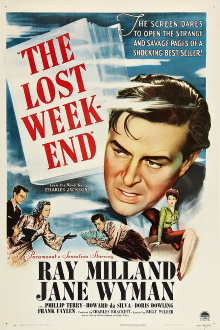Wikipedia’s description of this as a noir misled me as this has nothing to do with private detectives or criminal cases. This is instead Billy Wilder’s treatise on alcoholism, apparently based on Raymond Chandler. As usual with the director’s work, it is well made and must have been quite an eye-opener in its time. But by now it has been superseded by far grimmer and more realistic takes on various types of addiction and to my eyes is actually more fascinating in the choices that it must make to ensure that the main character retains the sympathy of the audience.
Don Birnam is supposed to leave for a weekend getaway with his brother Wick but he keeps procrastinating as he packs. He is in fact an alcoholic and is trying to smuggle a bottle of alcohol into the luggage. Wick discovers it and pours the alcohol into the sink but when Helen, Don’s girlfriend, arrives, he persuades them to delay the trip and go to a concert together while he stays at home. Wick relents, thinking that there is no alcohol left in the apartment and Don has no money. However he steals the $10 that Wick has hidden for the housekeeper and sets off for a nearby bar. He buys two bottles and has some drinks, intending to go back in time for the trip but predictably loses track of time, causing Wick to give up hope of helping him. Helen still loves him though and waits for him though he sneaks back into his apartment to avoid her. The next day he returns to the same bar. He unloads to the barkeeper Nat about his life story of how he is an aspiring writer who turned to drink when his college-level writing didn’t quite cut it in the adult world and never stopped. He has never worked at a job and instead survives on the charity of his brother.
This is a pretty detailed character portrait of an alcoholic that shows how he hits rock bottom over the course of being left alone over a weekend. He constantly lies, gets so desperate for his fix that he resorts to theft, trashes his apartment trying to find a bottle he stashed earlier and falls unconscious only to wake up in the alcoholic ward of the hospital. It’s the kind of moralizing message that wants to scare the audience into being sober and I suppose it must have been reasonably effective in its time as the liquor industry lobbied against it. By modern standards however, used as we are to far grimmer depictions of addictions to even more dangerous substances, this is pretty restrained fare. I’m not even sure that the amount of alcohol we seem him actually drink over the weekend is that impressive. We probably see him drink at most four or five bottles of hard liquor over, like, three days. That’s a lot but not so much I think that he wouldn’t still be a functional member of society, capable of holding down a job and maintaining meaningful relationships with others.
Then there’s also how the film wants to condemn alcoholism and yet wants to ensure that Birnam remains a sympathetic enough figure that we can feel sorry for him. That’s why he’s so articulate and good-looking that he can easily charm women despite being a jobless bum. He even gets to live in a nice apartment thanks to his brother and never has to worry about food. The film really wants to tell audiences of the time that this is such a respectable, educated, middle-class American man who is tragically undone by his addiction. But to modern eyes, all this makes him less sympathetic, not more. He is a man who has every possible advantage in life, benefits from innumerable safety nets whenever he so much as stumbles, and doesn’t even suffer from the consequences of the crimes he commits. The fact that his government provides an alcoholic ward for people like him is a kind of first world privilege. The fantasy that he can easily parley the story of his experience into a successful book is a ridiculous indulgence.
It’s understandable why Wilder made a film like in the context of the time and the milieu, but the fact is that viewing this as a treatise on alcoholism in the modern day is kind of offensive. It makes light of the far more serious problems poor people face with the disease and doesn’t even address the harm that alcoholics cause to others. This remains a solidly made film but is too much a product of its era to be worth watching today.
